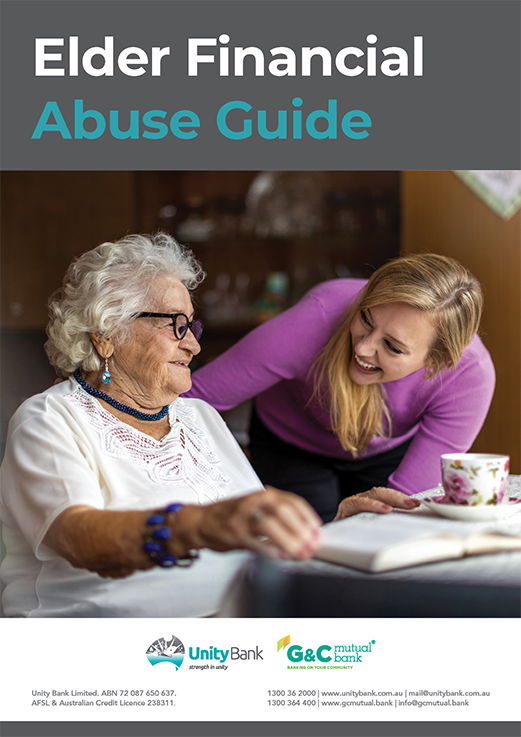Mon - Fri: 8:00am - 7:00pm (AEST)
-
What are you looking for?
Common Searches
Financial abuse comes in various forms, including, but not limited to, Elder Abuse and Domestic Abuse.
As a customer owned bank, we are a member focused, values-driven organisation and we are committed to making banking easy, safe and accessible for all of our members – especially those most vulnerable.
Elder abuse is the mistreatment of an older person, and it can take various forms ranging from physical and sexual assault, to neglect, psychological and financial mistreatment. Sadly, elder financial abuse is the most common form of elder abuse prevalent in the community and is likely to increase as the Australian population ages. Those over the age of 50 are most at risk, but it can happen to anyone, including you or someone you care about.
We’ve put together some helpful information in our Elder Abuse Guide to help you protect yourself or someone you love from elder financial abuse. It covers the various types of elder financial abuse, how to recognise the warning signs and safeguard against financial abuse, scams and fraud, as well as the various resources and support services available to assist.

Domestic financial abuse may occur when a person uses the money to gain power and control over their partner. This may happen via various methods including:
How can you protect yourself or a loved one?
If you are in danger, please call 000 immediately. It’s common for people to feel embarrassed and overwhelmed when talking about financial abuse. It’s important to learn the signs of financial abuse, where to go for help, and how to support a family member or friend who may be at risk. This can help victims recover and regain their financial independence.
If you or someone you know is impacted by financial abuse, you can submit a confidential request to our friendly staff who are there to assist, support and guide you as best they can. You can contact our friendly staff by:
| Company | Details |
| Help for families affected by relationship or separation issues | Family Relationship Advice Line 1800 050 321 8am to 8pm, Monday to Friday 10am to 4pm, Saturday |
| Crisis support | Lifeline 13 11 14 24 hours Crisis Support Chat |
| Family violence, abuse and sexual assault counselling | 1800RESPECT 1800 737 732 24 hours 1800RESPECT Online Chat |
| Family counselling, mediation and dispute resolution services | Relationships Australia 1300 364 277 |
| Elder abuse victim support | Compass 1800 ELDERHelp 1800 353 374 Note: this number redirects you to the phone line in your state or territory. Operating hours and services vary. |
| State and territory elder abuse victim resource centres | My Aged Care 1800 200 422 8am to 8pm, Monday to Friday 10am to 2pm, Saturday |